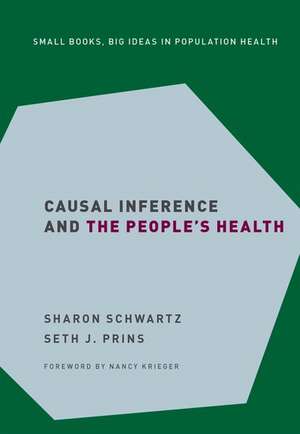Causal Inference and the People's Health: Small Books Big Ideas in Population Health
Autor Sharon Schwartz, Seth J. Prinsen Limba Engleză Hardback – 8 mai 2025
Preț: 228.38 lei
Preț vechi: 240.40 lei
-5% Nou
Puncte Express: 343
Preț estimativ în valută:
43.71€ • 45.46$ • 36.08£
43.71€ • 45.46$ • 36.08£
Carte disponibilă
Livrare economică 24 martie-07 aprilie
Preluare comenzi: 021 569.72.76
Specificații
ISBN-13: 9780197528587
ISBN-10: 0197528589
Pagini: 320
Ilustrații: 15 b&w line drawings; 11 tables
Dimensiuni: 109 x 168 x 28 mm
Greutate: 0.34 kg
Editura: Oxford University Press
Colecția OUP USA
Seria Small Books Big Ideas in Population Health
Locul publicării:New York, United States
ISBN-10: 0197528589
Pagini: 320
Ilustrații: 15 b&w line drawings; 11 tables
Dimensiuni: 109 x 168 x 28 mm
Greutate: 0.34 kg
Editura: Oxford University Press
Colecția OUP USA
Seria Small Books Big Ideas in Population Health
Locul publicării:New York, United States
Recenzii
The Causal Revolution has greatly advanced epidemiology's understanding of causal effects, but the cost of advancement has been to narrow the scope of permissible questions. In their excellent book, Schwartz and Prins propose a solution: a theoretical framework integrating the strengths of modern causal inference with sociologic and epidemiologic theory.
Insightful, intellectually honest, and a pleasure to read. Concisely unpacks recent debates on causal inference, and provides a path forward for a scientifically rigorous epidemiology that still generates knowledge about how the social world impacts health so that we as a society can decide what to do about it.
This book is a true gem. It illuminates the most fundamental questions we face about the uses of epidemiology to improve health and expand human rights. Exceptionally profound and scholarly, yet written with extraordinary clarity, it is accessible to anyone who wants to learn about or engage with these questions.
Insightful, intellectually honest, and a pleasure to read. Concisely unpacks recent debates on causal inference, and provides a path forward for a scientifically rigorous epidemiology that still generates knowledge about how the social world impacts health so that we as a society can decide what to do about it.
This book is a true gem. It illuminates the most fundamental questions we face about the uses of epidemiology to improve health and expand human rights. Exceptionally profound and scholarly, yet written with extraordinary clarity, it is accessible to anyone who wants to learn about or engage with these questions.
Notă biografică
Sharon Schwartz is a Professor of Epidemiology at Columbia University's Mailman School of Public Health. She is the training coordinator for the Psychiatric Epidemiology Training Program. Her main research interests are in the relationship between social statuses and psychiatric disorders, and how causal frameworks shape research processes.Seth J. Prins is Assistant Professor of Epidemiology and Sociomedical Sciences at Columbia University.He is a social and psychiatric epidemiologist whose two programs of research concern the collateral public health consequences of mass criminalization and mass incarceration, and how the division and structure of labor influence mental illness and substance use. His research integrates advanced epidemiologic methods with contemporary social theory to operationalize criminalization, punishment, and social class as dynamic relational processes rather than individual attributes.


